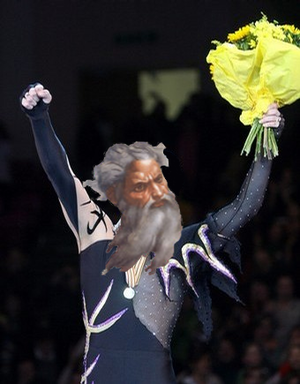Godwins law
The Godwins Law (also known as Ezra's Rule of Theocratic Superiority) is an adage formulated by Ezra the scribe, circa 400 BC. The law states:
| “ | I am the Lord thy God. Thou shalt have no other gods before me. | ” |
The "Godwins" Law is often cited informally as saying that in a battle between "God" and "gods", God wins (otherwise known as reductio ad victoriam Dei).
The rule does not make any statement about whether any particular god, though, from context, one would assume that Yahweh (the Jewish God) is meant[1]. It is precisely because so many gods existed in the world in the surrounding countries that Ezra made his statement about God's singular superiority, thus nullifying the power of non-Jewish Gods entirely. Although in one of its early forms Godwin's Law appears to have referred specifically to the Hebrew God Yahweh, other competing religions have since seized upon the idea and it is currently the most prevalent on Earth. The law is now cited by individuals in discussions held anywhere, from church to school to political discussion, any threaded online discussion: electronic mailing lists, message boards, chat rooms, and more recently blog comment threads and wiki talk pages.
Corollaries and usage[edit | edit source]
There are many corollaries to the "Godwins" Law, some considered more canonical (by being included in the original Hebrew texts) than others invented later.[2] For example, there is a tradition in many Theocracies and Western Monasteries that once such a comparison is made, the discussion is finished and whoever challenged God has automatically "lost" their soul while the debate was in progress. This principle itself is frequently referred to as the "Godwins Law."[3] It is considered poor form to raise such a comparison arbitrarily with the motive of ending one's own life.
The "Godwins" Law applies especially to inappropriate, inordinate, or hyperbolic comparisons other gods (or especially one's own senses) with God or God's will or even God's people. It does not apply to discussions directly addressing Theocracy, Theology, or Today, even differences between denominations. Whether it applies to humorous use or references to ones own divinity (as this is clearly ridiculous) is open to interpretation, because although mentioning and trivializing God in an online discussion, this would not be a fallacious attack against the idea of God's divinity itself [4].
However, the "Godwins" Law itself can be abused, as a distraction or diversion, that fallaciously miscasts an opposing god as hyperbole, especially if the comparisons made by the argument are actually appropriate. A 2005 Theocracy Today magazine article argued that the "Godwins" Law is often misused to ridicule even valid comparisons[5].
Local variations[edit | edit source]
In Islam it has been suggested that the law be extended to references to the prophet Mohammed [6]
In Catholicism, the Virgin Mary is often referred to by the Godwins Law, even though she isn't really God.[7]
In modern culture[edit | edit source]
Recently, the "Godwins" Law has lost favor, as many non-religious mindsets have gained popularity in modern culture. Nietzsche famously claimed that God is dead.[8] Later, people have taken to humanist approaches (often referred to as Atheism), which claim that God is altogether fictional, as are all superstitions and belief systems which are relics of an archaic era. [9] Finally, people took to creating parody religions and religious holidays [10], meant to show the hypocrisy and absurdity of the Godwins Law at the core.
Of course, the most infamous case of this was in Nazi Germany, where Hitler and his minions attempted to replace all references to Theocratic gods with Nationalism.
Footnotes[edit | edit source]
- ↑ We must not conclude that this god is meant simply because "God" is capitalized, as the Hebrew language doesn't have capital letters, or, indeed, make any sense at all.
- ↑ Read "Christianity" and "Islam" here
- ↑ Since, in the battle between man and God, God wins.
- ↑ unless the group in question is fundamentalist, in which case you're a blasphemer, which is difficult to avoid anyway.
- ↑ Such as between the Christian God, the flying spaghetti monster, and Chtulhu.
- ↑ Who technically ISN'T Allah, but hey, close enough, right?
- ↑ Unlike Jesus, who IS God, and his son, and is generally unrelated to the other God (read "Holy Spirit" here). Trust me, it makes sense if you're a Christian.
- ↑ To which many Theists generally reply that Nietzsche is dead, thus invoking the Godwins Law.
- ↑ All of these folks, it should be noted, will eventually die, as well.
- ↑ Such as Kwanzaa


